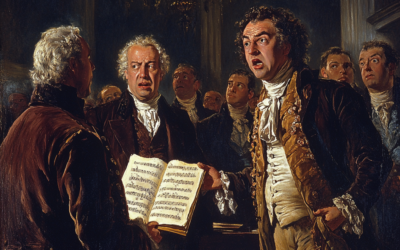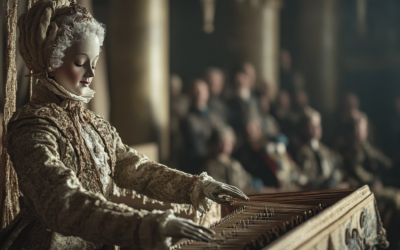Wolfgang Amadé Mozart
An Expedition Fueled by Ambition
The Mozarts’ Italian journey of 1769 was not a leisurely Grand Tour but a strategic mission driven by ambition, navigating the treacherous roads of 18th-century Europe in pursuit of fame and fortune.
Mozart in Italy: The Untold Story
Was Mozart truly a solitary genius, or was he merely the instrument of his father’s ambition? “Mozart in Italy” challenges the conventional narrative, revealing a complex dynamic between father and son that shaped the course of music history. Prepare to question everything you thought you knew.
“Leopold Mozart was not motivated by an uncontainable spirit of adventure, but by personal ambition, seeking new opportunities for himself and his son, armed with letters of introduction to nobility connected to the Habsburgs”
Mozart in Italy
In the late 18th century, travel was far from the convenient and rapid process we know today. For Leopold Mozart and his son Wolfgang, their journey to Italy in 1769 was not merely a touristic venture but a strategic mission driven by personal ambition and professional necessity. Unlike the Grand Tour undertaken by young aristocrats for education and cultural enrichment, the Mozarts’ journey was a calculated exploration of opportunities within the tightly-knit circles of European nobility, particularly those connected to the Habsburg dynasty.
The Reality of 18th-Century Travel
Travel in the 18th century was a grueling experience, requiring months of meticulous planning. Roads were often treacherous, and the discomforts of long hours in a jostling carriage were compounded by unpredictable weather and inadequate accommodations. Leopold and Wolfgang Mozart, like many other artists of their time, had to navigate these challenges while maintaining their focus on the ultimate goal: gaining recognition and securing lucrative opportunities in Italy.
The Mozart family’s journey differed significantly from the leisurely and educational Grand Tours of the European elite. While the young aristocrats of Europe traveled to broaden their horizons and solidify their cultural knowledge, Leopold’s motivations were more pragmatic. His aim was to position his son as a musical prodigy within the courts of Italy, leveraging connections and recommendations from key figures in the Habsburg-dominated regions.
The Strategic Itinerary
Leopold Mozart meticulously planned their route, which included stops in Innsbruck, Milan, Bologna, Florence, Rome, and Naples, among others. These cities were not chosen for their cultural offerings alone but for their political and social significance within the Habsburg influence. The Mozarts sought to ingratiate themselves with the nobility and secure performances that would elevate Wolfgang’s reputation as a composer and performer.
Leopold also tapped into the networks of Freemasonry to facilitate their journey. Connections with Masonic brothers provided them with introductions and invitations that opened doors to exclusive events and prestigious audiences. The support from figures like Johann Nepomuk Spaur and Carlo Gottardo von Firmian was crucial in securing Wolfgang’s performances in some of Italy’s most important musical venues, such as Milan’s Regio Ducal Teatro.
The Hardships of the Road
Despite the careful planning, the journey was not without its hardships. The Mozart duo avoided the crowded and uncomfortable public carriages, opting instead for private vehicles when possible. Even so, travel was far from luxurious. Carriages were often cramped, cold in winter, and stifling in summer. The roads were bumpy, making it impossible to compose music during the journey, contrary to the romanticized images some might hold today.
The Mozart manuscripts from this period reflect that any significant work was likely done in the relative comfort of their lodgings rather than in transit. The conditions of travel were such that even the most talented musician would struggle to maintain their creative flow while being jostled and subjected to the elements.
The First Steps in Italy
The Mozarts’ journey began on a positive note. In a letter dated December 14, 1769, sent from Wörgl in Tyrol, Leopold expressed his satisfaction with their carriage and driver, noting the smoothness of the journey and the comfort it afforded them. Wolfgang, too, was in high spirits, enjoying the warmth of the carriage and the adventurous spirit of their driver, who sped up whenever the road allowed.
Their first stop concluded with a restful night and a hearty meal, leaving them optimistic about the adventure that lay ahead. However, as they would soon discover, the road to success in Italy was as challenging as the physical journey itself.
You May Also Like
When the Myth Collapsed
Vienna exposed the myth: La Finta semplice was riddled with errors, and Wolfgang’s supposed opera genius was nothing more than Leopold’s fabrication. With their reputation in ruins, father and son turned to Italy, hoping to rewrite history.
The London Notebook and the Vienna Disaster
Far from the myth of a flawless young genius, Mozart’s London Notebook reveals musical struggles and guided exercises, while the Vienna opera disaster proved that his father played a far greater role in his compositions than legend would have us believe.
Versailles, Vanity, and the Pursuit of Prestige
Leopold Mozart’s letters transformed his son’s European tour into a carefully staged fantasy—filled with exaggerated encounters, fabricated royal admiration, and a relentless pursuit of social prestige. But how much of it was real?
The Fabricated Childhood of Mozart
The legend of young Mozart’s divine genius crumbles under scrutiny, revealing a childhood dictated by Leopold’s ambition, carefully constructed myths, and a relentless pursuit of fame at the expense of genuine artistic education.
The Man Behind the Myth
Leopold Mozart’s legacy has been shaped by myths and hagiographies, but his letters reveal a man more concerned with financial gain and self-promotion than artistic integrity. Was he truly a devoted father, or simply an opportunist?
Constanze vs. The Catholic Church
For over two centuries, scholars have debated the circumstances surrounding Mozart’s burial. Constanze Mozart’s supposed inability to mark his grave, the confrontation with the Catholic Church over funeral masses, and the baffling disappearance of Mozart’s body all contribute to a mystery stranger than fiction. Did a powerful group keep her silent? And what really happened to Mozart’s remains?







